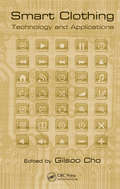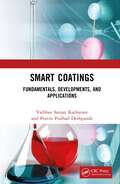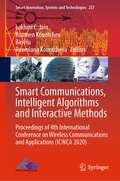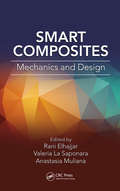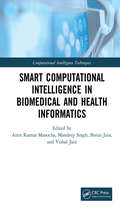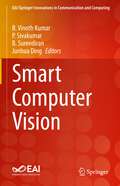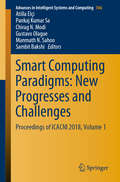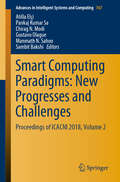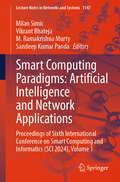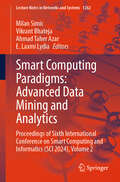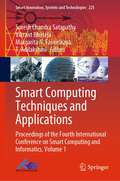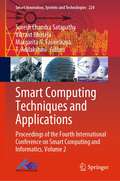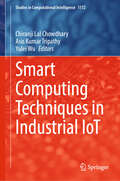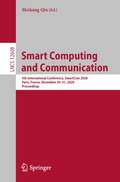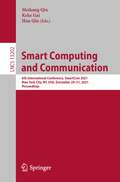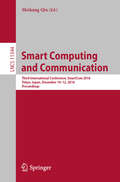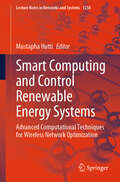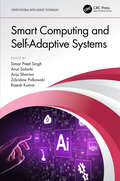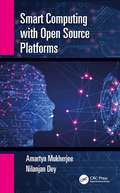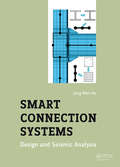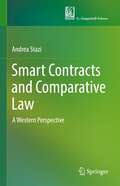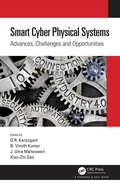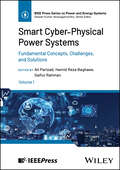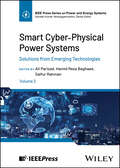- Table View
- List View
Smart Civil Structures
by You-Lin Xu Jia HeA smart civil structure integrates smart materials, sensors, actuators, signal processors, communication networks, power sources, diagonal strategies, control strategies, repair strategies, and life-cycle management strategies. It should function optimally and safely in its environment and maintain structural integrity during strong winds, severe earthquakes, and other extreme events. This book extends from the fundamentals to the state-of-the-art. It covers the elements of smart civil structures, their integration, and their functions. The elements consist of smart materials, sensors, control devices, signal processors, and communication networks. Integration refers to multi-scale modelling and model updating, multi-type sensor placement, control theory, and collective placement of control devices and sensors. And the functions include structural health monitoring, structural vibration control, structural self-repairing, and structural energy harvesting, with emphasis on their synthesis to form truly smart civil structures. It suits civil engineering students, professionals, and researchers with its blend of principles and practice.
Smart Clothing: Technology and Applications (Human Factors and Ergonomics)
by Gilsoo ChoGPS-embedded clothing for finding children or skiers when they are lost, bio-monitoring smart shirts, and vests that monitor a patient's vital signs are no longer science fiction but science fact. It is quite likely that within 20 or 30 years, computers, telephones, and televisions will be a part of our intimate clothing. Covering the whole design
Smart Coatings: Fundamentals, Developments, and Applications
by Vaibhav Sanjay Kathavate Pravin Pralhad DeshpandeThis book focuses on fundamentals, technology, synthesis, and characterizations and applied techniques from a practical point of view of coatings. The first three chapters offer a rigorous review of the application of these coatings to corrosion protection in various aerospace and oil and gas industries, and the subsequent chapters present a quick critical review of the state-of-the-art protection techniques of these coatings to novel biomedical applications such as clinical translations and tissue-engineered materials. Environmental, ergonomics, and aesthetic aspects and future perspectives are also explained at the end. Features: Explores the synthesis and application techniques of novel smart coatings in various research areas Presents a concise, critical, and state-of-the-art review of existing research on various types of smart coatings Ascertains the different mechanisms associated with the stimuli response of smart coatings Includes an exclusive chapter on real-time applications in the biomedical field Covers self-healing, self-cleaning, pH balance, early corrosion detection, and triggering mechanisms This book is aimed at researchers and graduate students specifically in smart coatings and thin films and corrosion, including chemical, materials science engineering, industrial and manufacturing engineering, and nanotechnology.
Smart Communications, Intelligent Algorithms and Interactive Methods: Proceedings of 4th International Conference on Wireless Communications and Applications (ICWCA 2020) (Smart Innovation, Systems and Technologies #257)
by Lakhmi C. Jain Bin Hu Roumen Kountchev Roumiana KountchevaThis book gathers selected papers presented at the 4th International Conference on Wireless Communications and Applications (ICWCA 2020), held at Hainan University, China. The first volume of the proceedings will focus on the newest methods and algorithms in smart wireless communications in the areas of multimedia communications over wireless; smart antenna and space-time signal processing; antenna, wireless propagation, and channel modeling; OFDM and multi-carrier techniques; localization and navigation techniques; software-defined networking (SDN) and network function virtualization (NFV); knowledge-defined networking (KDN) and the applications of artificial intelligence (AI) in future networks; future data-center networks; resource allocation and orchestration in future networks and many others.
Smart Composites: Mechanics and Design (Composite Materials)
by Rani Elhajjar Valeria La Saponara Anastasia MulianaSmart Composites: Mechanics and Design addresses the current progress in the mechanics and design of smart composites and multifunctional structures. Divided into three parts, it covers characterization of properties, analyses, and design of various advanced composite material systems with an emphasis on the coupled mechanical and non-mechanical be
Smart Computational Intelligence in Biomedical and Health Informatics (Computational Intelligence Techniques)
by Amit Kumar ManochaSmart Computational Intelligence in Biomedical and Health Informatics presents state-of-the-art innovations; research, design, and implementation of methodological and algorithmic solutions to data processing problems, including analysis of evolving trends in health informatics and computer-aided diagnosis. This book describes practical, applications-led research regarding the use of methods and devices in clinical diagnosis, disease prevention, and patient monitoring and management. It also covers simulation and modeling, measurement and control, analysis, information extraction and monitoring of physiological data in clinical medicine and the biological sciences. FEATURES Covers evolutionary approaches to solve optimization problems in biomedical engineering Discusses IoT, Cloud computing, and data analytics in healthcare informatics Provides computational intelligence-based solution for diagnosis of diseases Reviews modelling and simulations in designing of biomedical equipment Promotes machine learning-based approaches to improvements in biomedical engineering problems This book is for researchers, graduate students in healthcare, biomedical engineers, and those interested in health informatics, computational intelligence, and machine learning.
Smart Computer Vision (EAI/Springer Innovations in Communication and Computing)
by P. Sivakumar B. Vinoth Kumar B. Surendiran Junhua DingThis book addresses and disseminates research and development in the applications of intelligent techniques for computer vision, the field that works on enabling computers to see, identify, and process images in the same way that human vision does, and then providing appropriate output. The book provides contributions which include theory, case studies, and intelligent techniques pertaining to computer vision applications. The book helps readers grasp the essence of the recent advances in this complex field. The audience includes researchers, professionals, practitioners, and students from academia and industry who work in this interdisciplinary field. The authors aim to inspire future research both from theoretical and practical viewpoints to spur further advances in the field.
Smart Computing Paradigms: Proceedings of ICACNI 2018, Volume 1 (Advances in Intelligent Systems and Computing #766)
by Manmath N. Sahoo Pankaj Kumar Sa Sambit Bakshi Gustavo Olague Atilla Elçi Chirag N. ModiThis two-volume book focuses on both theory and applications in the broad areas of communication technology, computer science and information security. It brings together contributions from scientists, professors, scholars and students, and presents essential information on computing, networking, and informatics. It also discusses the practical challenges encountered and the solutions used to overcome them, the goal being to promote the “translation” of basic research into applied research, and of applied research into practice. The works presented here will also demonstrate the importance of basic scientific research in a range of fields.
Smart Computing Paradigms: Proceedings of ICACNI 2018, Volume 2 (Advances in Intelligent Systems and Computing #767)
by Manmath N. Sahoo Pankaj Kumar Sa Sambit Bakshi Gustavo Olague Atilla Elçi Chirag N. ModiThis two-volume book focuses on both theory and applications in the broad areas of communication technology, computer science and information security. It brings together contributions from scientists, professors, scholars and students, and presents essential information on computing, networking, and informatics. It also discusses the practical challenges encountered and the solutions used to overcome them, the goal being to promote the “translation” of basic research into applied research, and of applied research into practice. The works presented here will also demonstrate the importance of basic scientific research in a range of fields.
Smart Computing Paradigms: Proceedings of Sixth International Conference on Smart Computing and Informatics (SCI 2024), Volume 1 (Lecture Notes in Networks and Systems #1147)
by Vikrant Bhateja Sandeep Kumar Panda Milan Simic M. Ramakrishna MurtyThis book presents best-selected papers presented at the 6th International Conference on Smart Computing and Informatics (SCI 2024), held at the Department of Computer Science and Engineering, Anil Neerukonda Institute of Technology & Sciences (ANITS), Visakhapatnam, India, during 19–20 April 2024. It presents advanced and multidisciplinary research towards the design of smart computing and informatics. The theme is on a broader front and focuses on various innovation paradigms in system knowledge, intelligence and sustainability that may be applied to provide realistic solutions to varied problems in society, environment and industries. The scope is also extended towards the deployment of emerging computational and knowledge transfer approaches, optimizing solutions in various disciplines of science, technology and healthcare. The work is published in three volumes.
Smart Computing Paradigms: Proceedings of Sixth International Conference on Smart Computing and Informatics (SCI 2024), Volume 2 (Lecture Notes in Networks and Systems #1262)
by Ahmad Taher Azar Vikrant Bhateja Milan Simic E. Laxmi LydiaThis book presents best-selected papers presented at 6th International Conference on Smart Computing and Informatics (SCI 2024), held at Department of Computer Science and Engineering, Anil Neerukonda Institute of Technology & Sciences (ANITS), Visakhapatnam, India, during 19 – 20 April 2024. It presents advanced and multidisciplinary research toward the design of smart computing and informatics. The theme is on a broader front and focuses on various innovation paradigms in system knowledge, intelligence and sustainability that may be applied to provide realistic solutions to varied problems in society, environment and industries. The scope is also extended toward the deployment of emerging computational and knowledge transfer approaches, optimizing solutions in various disciplines of science, technology and healthcare. The work is published in three volumes.
Smart Computing Techniques and Applications: Proceedings of the Fourth International Conference on Smart Computing and Informatics, Volume 1 (Smart Innovation, Systems and Technologies #225)
by Margarita N. Favorskaya Suresh Chandra Satapathy Vikrant Bhateja T. AdilakshmiThis book presents best selected papers presented at the 4th International Conference on Smart Computing and Informatics (SCI 2020), held at the Department of Computer Science and Engineering, Vasavi College of Engineering (Autonomous), Hyderabad, Telangana, India. It presents advanced and multi-disciplinary research towards the design of smart computing and informatics. The theme is on a broader front which focuses on various innovation paradigms in system knowledge, intelligence and sustainability that may be applied to provide realistic solutions to varied problems in society, environment and industries. The scope is also extended towards the deployment of emerging computational and knowledge transfer approaches, optimizing solutions in various disciplines of science, technology and health care.
Smart Computing Techniques and Applications: Proceedings of the Fourth International Conference on Smart Computing and Informatics, Volume 2 (Smart Innovation, Systems and Technologies #224)
by Margarita N. Favorskaya Suresh Chandra Satapathy Vikrant Bhateja T. AdilakshmiThis book presents best selected papers presented at the 4th International Conference on Smart Computing and Informatics (SCI 2020), held at the Department of Computer Science and Engineering, Vasavi College of Engineering (Autonomous), Hyderabad, Telangana, India. It presents advanced and multi-disciplinary research towards the design of smart computing and informatics. The theme is on a broader front which focuses on various innovation paradigms in system knowledge, intelligence and sustainability that may be applied to provide realistic solutions to varied problems in society, environment and industries. The scope is also extended towards the deployment of emerging computational and knowledge transfer approaches, optimizing solutions in various disciplines of science, technology and health care.
Smart Computing Techniques in Industrial IoT (Studies in Computational Intelligence #1172)
by Yulei Wu Chiranji Lal Chowdhary Asis Kumar TripathyThe book provides a conceptual framework and roadmap for applications and research trends in Smart Computing Techniques in Industrial IoT. This volume aims to provide information on emerging fields of intelligent computing techniques with a particular emphasis on industrial IoT development and applications of artificial intelligence, deep learning techniques, computational intelligence methods, the Internet of Medical Things (IoMT), optimization techniques, blockchain, and cloud computing. It will be a useful guide for undergraduate and postgraduate students studying artificial intelligence, deep learning, industry 4.0, industry 5.0, smart cities, machine learning, deep learning computational intelligence, and edge/cloud computing.
Smart Computing and Communication: 5th International Conference, SmartCom 2020, Paris, France, December 29–31, 2020, Proceedings (Lecture Notes in Computer Science #12608)
by Meikang QiuThis book constitutes the proceedings of the 5th International Conference on Smart Computing and Communication, SmartCom 2020, which took place in Paris, France, during December 29-31, 2020.The 30 papers included in this book were carefully reviewed and selected from 162 submissions. The scope of SmartCom 2020 was broad, from smart data to smart communications, from smart cloud computing to smart security. The conference gathered all high-quality research/industrial papers related to smart computing and communications and aimed at proposing a reference guideline for further research.
Smart Computing and Communication: 6th International Conference, SmartCom 2021, New York City, NY, USA, December 29–31, 2021, Proceedings (Lecture Notes in Computer Science #13202)
by Meikang Qiu Keke Gai Han QiuThis book constitutes the proceedings of the 6th International Conference on Smart Computing and Communication, SmartCom 2021, which took place in New York City, USA, during December 29–31, 2021.* The 44 papers included in this book were carefully reviewed and selected from 165 submissions. The scope of SmartCom 2021 was broad, from smart data to smart communications, from smart cloud computing to smart security. The conference gathered all high-quality research/industrial papers related to smart computing and communications and aimed at proposing a reference guideline for further research.* Conference was held online due to the COVID-19 pandemic.
Smart Computing and Communication: Third International Conference, SmartCom 2018, Tokyo, Japan, December 10–12, 2018, Proceedings (Lecture Notes in Computer Science #11344)
by Meikang QiuThis book constitutes the refereed proceedings of the Third International Conference on Smart Computing and Communications, SmartCom 2018, held in Tokyo, Japan, in December 2018. The 45 papers presented in this volume were carefully reviewed and selected from 305 submissions. They focus on topics from smart data to smart communications, as well as smart cloud computing to smart security.
Smart Computing and Control Renewable Energy Systems: Advanced Computational Techniques for Wireless Network Optimization (Lecture Notes in Networks and Systems #1238)
by Mustapha HattiThis essential book bridges the gap between cutting-edge artificial intelligence and the dynamic world of renewable energy systems. Embark on a journey to the forefront of sustainable energy innovation with this groundbreaking collection of research papers and expert insights. Designed for curious minds and industry leaders alike, this comprehensive resource offers: - A deep dive into the latest advancements in smart computing for sustainable energy. - Exploration of AI-driven techniques revolutionizing energy efficiency and management. - Real-world applications showcasing the transformative power of intelligent systems in renewables. - Insights into futuristic energy infrastructures powered by artificial intelligence. - A perfect blend of theoretical foundations and practical implementations. To a seasoned researcher pushing the boundaries of knowledge, a graduate student aspiring to make a mark, or an industry professional staying ahead of the curve, this book is a gateway to the future of energy. Discover how machine learning is reshaping solar forecasting, uncover the potential of autonomous systems in energy storage, and explore the role of AI in crafting smarter, more sustainable cities. From predictive maintenance that ensures uninterrupted power to intelligent control systems optimizing energy generation, this book covers it all. Don't just witness the renewable energy revolution—be part of it. This book equips readers with the knowledge and inspiration to drive innovation in this critical field. It is more than a collection of papers; it is a roadmap to a sustainable future where smart computing and renewable energy converge. Prepare to challenge your assumptions, expand your expertise, and contribute to a greener tomorrow. Order your copy today and position yourself at the vanguard of the smart energy movement!
Smart Computing and Self-Adaptive Systems (Computational Intelligence Techniques)
by Rajesh Kumar Zdzislaw Polkowski Arun Solanki Simar Preet Singh Anju SharmaThe book intends to cover various problematic aspects of emerging smart computing and self-adapting technologies comprising of machine learning, artificial intelligence, deep learning, robotics, cloud computing, fog computing, data mining algorithms, including emerging intelligent and smart applications related to these research areas. Further coverage includes implementation of self-adaptation architecture for smart devices, self-adaptive models for smart cities and self-driven cars, decentralized self-adaptive computing at the edge networks, energy-aware AI-based systems, M2M networks, sensors, data analytics, algorithms and tools for engineering self-adaptive systems, and so forth. Acts as guide to Self-healing and Self-adaptation based fully automatic future technologies Discusses about Smart Computational abilities and self-adaptive systems Illustrates tools and techniques for data management and explains the need to apply, and data integration for improving efficiency of big data Exclusive chapter on the future of self-stabilizing and self-adaptive systems of systems Covers fields such as automation, robotics, medical sciences, biomedical and agricultural sciences, healthcare and so forth This book is aimed researchers and graduate students in machine learning, information technology, and artificial intelligence.
Smart Computing with Open Source Platforms
by Nilanjan Dey Amartya MukherjeeFocuses on the concept of open source prototyping and product development and designing sensor networks and covers IoT base applications This book will serves as a single source of introductory material and reference for programming smart computing and Internet of Things (IoT) devices using Arduino with the use of Python It covers number of comprehensive DIY experiments through which the reader can design various intelligent systems
Smart Connection Systems: Design and Seismic Analysis
by Jong Wan HuThis book introduces new smart connection systems which can be used in aseismic building design in order to control inter-story drifts and to reduce residual displacements. They are also utilized as damper devices and base isolators. The application of these systems to composite moment frame buildings will also be treated in the book. In addition,
Smart Contracts and Comparative Law: A Western Perspective
by Andrea StaziThe book analyzes the most relevant developments in the relation between contracts and technology, from automatically concluded contracts to today's revolutionary "smart contracts" developed through blockchain, which are beginning to and will increasingly disrupt many economic and social relations. First of all, the author offers a broad analysis of the peculiarities and evolution of the relation between contracts and technology. The main features and elements of electronic contracts are then examined in depth to highlight the specific rules applicable to them in the international comparative legal framework. In turn, the book provides a detailed explanation of the technology, economic and social dynamics, and legal issues concerning blockchain and smart contracts. The analysis focuses on the question of the legal nature of smart contracts, the issues posed by their development and the first legal solutions adopted in some countries. The comparative approach pursued makes it possible to focus attention on the first solutions adopted until now in various systems, with particular regard to the circulation of models and ideas and to the specificities of their local variations, in terms of e.g. applicable law and jurisdiction. In reviewing the characteristics of distributed ledger technologies, and in particular of the blockchain technology on which smart contracts are based, above all the peculiarities of the latter are taken into consideration, especially automatic execution and resistance to tampering, which simultaneously present significant opportunities and complex legal issues. A comprehensive framework is then provided to reconcile smart contracts with comparative contract law, in order to define the scope and specificities of their binding force, legal effectiveness and regulation in various legal systems. Lastly, with specific reference to the elements, pathologies and contractual remedies for smart contracts, the book examines the peculiarities of their application and the main issues that emerge in comparative contract law in order to promote their harmonized use, in keeping with the transnational nature of such a revolutionary tool.
Smart Cyber Physical Systems: Advances, Challenges and Opportunities
by G.R. Karpagam, B. Vinoth Kumar, J. Uma Maheswari and Xiao-Zhi GaoSmart Cyber Physical Systems: Advances, Challenges and Opportunities ISBN: 9780367337889 Cyber Physical Systems (CPS) are the new generation of collaborative computational entities, with a prime focus on integration of the physical world and cyber space. Through a feedback mechanism, the system adapts itself to new conditions in real time. The scope of this book includes research experience by experts in CPS infrastructure systems, incorporating sustainability by embedding computing and communication in day-to-day applications. CPS, integrated with Blockchain, Artificial Intelligence, Internet of Things, Big Data, Cloud Computing and Communication, lay a foundation for the fourth industrial revolution, Industry 4.0. This book will be of immense use to practitioners in industries with a focus on autonomous and adaptive configuration, and on optimization, leading to increased agility, elasticity and cost effectiveness. The contributors of this book include renowned academics, industry practitioners and researchers. It offers a rigorous introduction to the theoretical foundations, techniques and practical solutions, through case studies. Building CPS with effective communication, control, intelligence and security is discussed in terms of societal and research perspectives. The objective of this book is to provide a forum for researchers and practitioners to exchange ideas and to achieve progress in CPS by highlighting applications, advances and research challenges. It is highly recommended to be used as a reference book for graduate and post-graduate level programmes in universities, with a focus on research in computer science-related courses.
Smart Cyber-Physical Power Systems, Volume 1: Fundamental Concepts, Challenges, and Solutions (IEEE Press Series on Power and Energy Systems)
by Ali Parizad; Hamid Reza Baghaee; Saifur RahmanAuthoritative, highly comprehensive guide on how emerging technologies can address various challenges in different sectors of smart cyber-physical power systems As the world shifts towards smarter and more resilient energy systems, cyber-physical power systems (CPSs) represent a critical step in modernizing the power infrastructure. Smart Cyber-Physical Power Systems, Volume 1: Fundamental Concepts, Challenges, and Solutions, offers an in-depth exploration of the fundamental concepts, structures, and major challenges that underlie these complex systems. It covers the essential theories and frameworks that drive the integration of digital technologies with physical power systems, including smart grids, microgrids, and the Internet of Energy. This volume addresses a range of crucial topics, from global demand response strategies and microgrid architectures to smart energy management in cities and advanced distributed control strategies. Additionally, it highlights key challenges such as ensuring resiliency, protecting against cyberattacks, and maintaining reliability in the face of rapid technological advancements. Experts from around the world contribute to this volume, sharing vital insights into the transformation of traditional power systems into adaptive, cyber-physical networks. Their focus on the growing importance of privacy, security, and data analytics makes this book a critical resource for anyone involved in power system research, offering essential tools to navigate and shape the future landscapes of energy systems. Whether you’re a researcher, engineer, or industry professional, this volume provides the foundational knowledge needed to understand the evolving landscape of smart cyber-physical power systems and the significant challenges they face. Join us on a journey through the landscape of Smart Cyber-Physical Power Systems (CPPSs), where cutting-edge solutions meet the challenges of today and forge the energy paradigms of tomorrow, driven by AI/ML, Big Data, Blockchain, IoT, Quantum Computing, Information Theory, Edge Computing, Metaverse, DevOps, and more.
Smart Cyber-Physical Power Systems, Volume 2: Solutions from Emerging Technologies (IEEE Press Series on Power and Energy Systems)
by Saifur Rahman Ali Parizad Hamid Reza BaghaeeA practical roadmap to the application of artificial intelligence and machine learning to power systems In an era where digital technologies are revolutionizing every aspect of power systems, Smart Cyber-Physical Power Systems, Volume 2: Solutions from Emerging Technologies shifts focus to cutting-edge solutions for overcoming the challenges faced by cyber-physical power systems (CPSs). By leveraging emerging technologies, this volume explores how innovations like artificial intelligence, machine learning, blockchain, quantum computing, digital twins, and data analytics are reshaping the energy sector. This volume delves into the application of AI and machine learning in power system optimization, protection, and forecasting. It also highlights the transformative role of blockchain in secure energy trading and digital twins in simulating real-time power system operations. Advanced big data techniques are presented for enhancing system planning, situational awareness, and stability, while quantum computing offers groundbreaking approaches to solving complex energy problems. For professionals and researchers eager to harness cutting-edge technologies within smart power systems, Volume 2 proves indispensable. Filled with numerous illustrations, case studies, and technical insights, it offers forward-thinking solutions that foster a more efficient, secure, and resilient future for global energy systems, heralding a new era of innovation and transformation in cyber-physical power networks. Welcome to the exploration of Smart Cyber-Physical Power Systems (CPPSs), where challenges are met with innovative solutions, and the future of energy is shaped by the paradigms of AI/ML, Big Data, Blockchain, IoT, Quantum Computing, Information Theory, Edge Computing, Metaverse, DevOps, and more.

